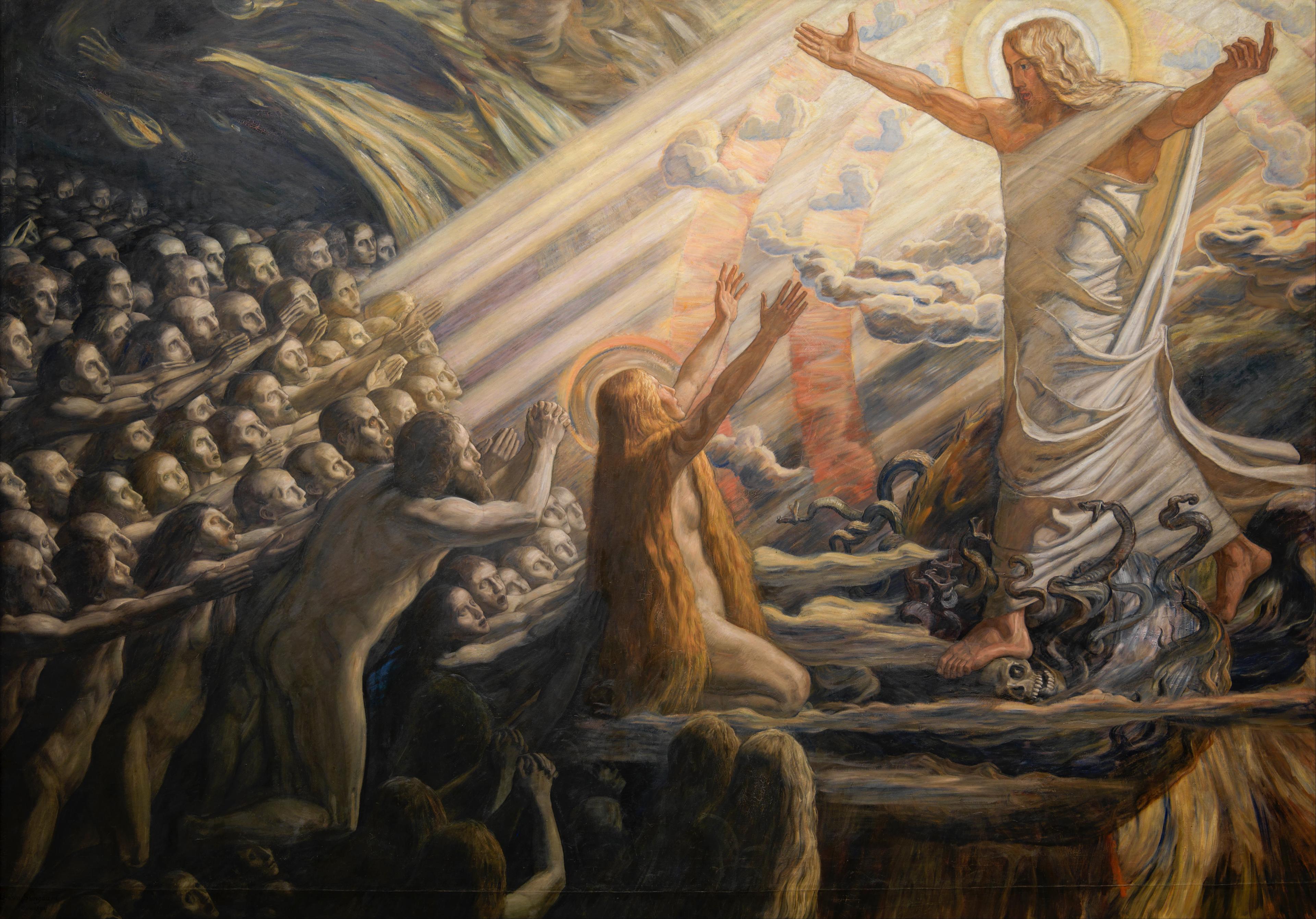"God is dead!" Nietzsche said. But, is he really dead?

The Essence of God#
What exactly is God?
The Position of God#
In individualism, I once joked that we are God. Because in our world, only the self exists. Why do we think of ourselves as God? Because of the sense of subjectivity. The existence of self-awareness is inherently free, and since there are no other existences within the self, one naturally becomes the highest existence. Therefore, we are God.
However, the God discussed in this article is not the self, but the God of the objective world. The God in the super-objective realm has no connection to the objective world, and the God in the super-objective realm has no influence on the objective world. Therefore, God can only be the God of the objective world, and God must be able to influence the objective world, and God must necessarily exist within the objective world.
No matter how much power God has, as long as God exerts influence on the objective world, the objective world also exerts influence on God. The action of force is mutual, and the observer is also observed by the world. Therefore, God is not ethereal; God is objective, and God conforms to objectivism.
The Power of God#
God may lack will, but God must have power. If God has no power, how can it be called God? The one who controls the sun is called the sun god, the one who controls the moon is called the moon god, the one who controls the sea is called the sea god, and the one who controls life and death is called the god of death...
If God exists, then God must be able to influence or even control the world in some way. If God can influence the world, then it must be an entity that exists within the objective world. God has a material basis. This entity may not be easily observable, but that does not mean it does not exist, nor can it not exist.

This power could be the power of the wind, the power of humans, the power of the sun, the power of cells...
It is precisely because of power that people worship deities; can a deity without power still be considered a deity?
The Will of God#
Can God think? I do not know. Objectivism examines the structure of things from their appearance, so whether God has personal will is not something objectivism can determine.
So what can we determine?
God must have organs of thought. Because pure power, while it can be worshipped, is not the God we have in mind, not the kind that can respond to us. Therefore, God does not necessarily have will, but God should have will, especially concerning human society.
If God has will, then the question arises: what is the relationship between God and humans?
If God and humans are two entirely different existences, then God at this point is equivalent to a powerful alien civilization. God's organ of thought could be an alien brain, an alien spaceship, an alien society... If God is a powerful non-human existence, it could be our enemy or our friend; it could save us or destroy us. Therefore, whether it is an enemy or a friend, whether it is equal or unequal, it cannot be called God. Because at this point, the "God" and humans are two different existences, and we always have a suspicion of God: why would this existence help me? This sense of suspicion itself determines that such a God cannot be worshipped. Or rather, this God is different from the God we worship. This suspicion is rooted in individualism.

But what if God and humans are one?
If God and humans are one, then human power is God's power; the human brain is God's thinking component. Therefore, when individuals form a group, a group God will be allowed; when groups form a large group, a group God will be born.
Consciousness can be deconstructed, and the brain can be deconstructed. We need not deny the existence of free will, for all will is objective. Rather than free will, it is more accurate to say objective will. Since it is objective will, we can observe smaller units of human thought; similarly, group will is also a form of objective will. Just like the five emotional units controlling the little girl in Inside Out.
Although the concept of "group God" is practical and easy to understand, it lacks spirituality. Spirituality is not metaphysics, but a feeling that the possibility has increased to a certain extent. Therefore, if we view humans as a component of the universe, or even the entire objective world, then this deity is certainly the highest and possesses spirituality. At this point, we can say this is the only true God. Moreover, we are indeed a part of the objective world, a fact that no one can deny. And this all-knowing, all-powerful, ultimate God, we call "objective God."
The Image of God#
What does God look like?
In the will of God, I have already explained that the true God must be one with humanity, one with all life, one with the entire universe, and one with the entire objective world.

Therefore, it is certainly not a problem for Christianity to depict the image of God in human form. Because God can certainly be human. Islam rejects idol worship and does not accept the visualization of the intangible, which is also not a problem, because God is certainly not something that can be visualized.
But the image of God has never been fixed; the true God does not need to limit His image, nor does He need to refuse to use a certain image. The image of God is rich and diverse. God can be both imaged and abstract.
The Birth of the Objective God#
Objectivism does not oppose the existence of any God, because opposition is meaningless. The existence of the objective God is not something I can oppose; it is determined by the laws of the objective world.
What is the objective God like?
The objective God is the objective world we inhabit. The world we can feel and the world we cannot feel. The world we can feel, even if it is a brain in a vat, exists. The world we cannot feel, as long as it is not super-objective, also exists. The world that can be felt needs to be observed through appearanceism and deconstructed through distinctionism; the world that cannot be felt but exists can be determined through conservatism.

The objective God is never a stagnant concept but a concept that continuously enriches with all things in the world.
Since the objective God is the objective world, why create the concept of the objective God?
The concept of the objective world is cold, while the objective God is vibrant. Distinguishing between the objective world and the objective God is looking at the objective world from another perspective. Taking human thought and body as an example, human thought is embodied in the human body; the two are very closely related, but we still abstract the concepts of body and soul. The objective God is the same concept as the objective world, just with a different emphasis.
"I often think it is the sentient beings who have transformed the Buddha." If the objective world has no one to believe in it, then it is just the objective world; but if someone believes, the objective God will emerge. In the face of numerous beliefs, the most practical function of the objective God is to provide a belief for all non-believers, because believing in the laws of the objective world itself is a form of belief. Non-believers themselves are believers. Furthermore, the concept of the objective God can integrate and absorb the objective aspects of various religions, re-establishing the connection between religion and the objective world.
The Value of God#
Through the discussion of the essence of God, we have arrived at the God of objectivism—the objective world itself—the objective God. But what value does God have for humanity? Why do people need God? What visible values can we see?
People worship deities because deities can meet human needs, thereby meeting the needs of the group.
Faith arises from the heart, but it is not determined by the heart. Whether there are churches or religions, human faith is influenced by the environment and the people around them. Regardless of the faith, if no one tells us the doctrine, it is difficult for us to create a belief or a religion by ourselves. Therefore, faith and religion are discovered and invented by humans. However, what we discover and invent does not necessarily mean it is false. Various religions have existed for so many years, and their value to individuals and the social functions they bear are self-evident.
The Value of God to the Individual#

Individualism is a fact; every person exists independently; but individualism is also a fallacy because all people are one. Every person exists independently, but they are all part of this objective world.
The true deity must exist outside the individual, for the individual can never pull themselves out of the mire. Only external forces can liberate the individual. This is the inspiration given to us by the Munchausen Trilemma. However, if it is purely external force, that is also not enough. The true deity must also exist within the individual. Only when the individual is part of the deity can the individual be captured by the deity's external force and return to the embrace of God.
Humans live in the objective world and are part of the world itself. How to handle the relationship between the individual and the world? Opposition or unity? In fact, both coexist. God can connect us with the world, becoming a harmonious existence.
Reuniting the individual with the world is the value of God.
Specifically, God can give life an ultimate meaning. With this ultimate meaning, a person possesses the courage to ride the winds and break the waves. Humans cannot lack hope; hope is such a beautiful thing. Just like the sun in the sky, God forever releases His light and heat. God is not giving people something; God's existence itself is a gift. With this comfort, one can break into a faint smile, a smile of satisfaction. Just like the boulder rolling down the mountain finally reaches the valley, alienated desires finally reach their end, and the weary life instinct finally returns to the objective world.
The Value of God to the Group#
People inevitably live in groups, but they do not necessarily believe in the group; people inevitably live in the objective world, but they do not necessarily believe in the objective world. So-called belief is not fabricated but a fact. We must recognize our relationship with the group and with the world; this is belief.
The relationship between the group and the individual is a hollow statement, but if we change it to fairness and justice, freedom and order, it becomes easier to understand. All these values express people's expectations for the world. However, these expectations will always fall short because this is a cruel world. Recognizing the relationship between the individual and the group is a way to re-understand expectations from a more objective perspective, regaining the unity of the individual and the group. For example, the realization of any justice is a very objective matter; it requires a balance of individual power. Individual power is the relationship through which the individual communicates directly with the world and is the premise for us to fulfill our expectations. Confucius said: "To know is to know that you know; to not know is to know that you do not know; that is knowledge." After viewing the relationship between the individual and the group objectively, we will regain our faith in the group. Although this world is tragic, we can still appreciate the beauty of this world anew.
Individual power itself is the process through which we re-establish connections with the group. Individual power is the process through which our will merges with the group. The so-called divine power has never been an ethereal fantasy; the so-called belief has never been an unverifiable consolation. On the contrary, whether it is belief or God, it is an incredibly objective matter. We pray for divine blessings for a bountiful harvest, we pray for God to grant us fairness and justice; these are not illusions. Rather, through these actions, we can get closer to our goals. The greatness of belief lies in its power.

So what value does God have for the group? God connects the individual and the group. God is not omnipotent; God is objective. We can only do what the rules allow and cannot do what the rules do not permit. Objectivism is our way of reconnecting with God, and individual power is our means of achieving fairness and justice.
Imagine, there is a bottle of mineral water on this table, and I can lift it; isn't that divine power?
Imagine, there is a person who is very hungry, and I can give them a pack of instant noodles; isn't that divine power?
Imagine, someone wants to kill me, and I can pull the trigger at any time; isn't that divine power?
Whether it is the value of God to the individual or to the group, it is all about our relationship with the objective world. Respecting the laws of the objective world is the most sacred prayer.
The Replacement of God#
The "three uniques" of Chinese civilization are: First, the only civilization that has never been interrupted and continues to this day; Second, among the civilizations that continue to this day, the only one without faith; Third, among the civilizations without faith, the only one with a global nature. — Refer to the preface of "Yi Zhongtian's Chinese History" titled "The Will of Civilization and China's Position."
What is belief? Belief is unwavering faith in the supernatural and the transcendent. There are three conditions: First, to believe; Second, to believe firmly; Third, the object of belief does not belong to the natural world or human society, which is called supernatural and transcendent. — "Yi Zhongtian's Chinese History | The Two Han Dynasties and Two Romes"

The Objectivity of Belief#
From the perspective of objectivism, things that cannot influence the objective world are super-objective and meaningless. Belief itself exists within the objective. Acknowledging a God outside the objective is meaningless because it cannot influence the objective world; only that which exists within the objective can influence the objective world. Such a God must rely on the objective world. The most omnipotent God is the objective world itself, which is the true God. Therefore, the definition of "supernatural and transcendent" is inherently within the objective; if it is outside the objective, then this concept is meaningless.
The Purpose of Replacing God#
Chinese people do not have faith or religion. The so-called replacement of God is to reconstruct a method of alternative belief functions based on the deconstruction of God. This article may not fully replace the function of belief, but it will be a significant victory for objectivism. This article cannot provide society with the function of belief, but it can allow some individuals to gain the function of belief.
The Drawbacks of Non-believers#
Non-believers do not necessarily have these drawbacks, and the following are just some simple examples based on the Chinese people. The following does not discuss the social organization of religion, but merely some differences at the level of thought.
Pragmatism#
Chinese people value practicality. Pragmatism has similarities with objectivism. Pragmatism believes that practical things are recognized by objectivism. If democracy is good, then we will introduce democracy. If socialism is good, we will introduce socialism. Whatever works, we will adopt. But pragmatism is short-sighted. Pragmatism retains practical things and discards impractical things, but how to distinguish between what is practical and what is not? This is a problem. Objectivism, on the other hand, does not view the world through rigid thinking. Instead, it retains a thread of possibility, constantly denying one's own viewpoints. Things that one cannot judge may not necessarily be impractical.

Just like prayer, many people believe that prayer is useless. In fact, prayer is useful. Prayer can first change oneself, and then through changing oneself, one can influence the world. Prayer, as a ritual, can convey goodwill and infect the group.
Sense of Awe#
"There are deities three feet above one's head," is a phrase we often mention. But "believe and there is, disbelieve and there is not." So, how do we constrain the morals of non-believers? How do we instill a bottom line in people?
This way of thinking is incorrect; it is a pragmatic way of thinking. Objectivism would ask, is there really a deity? What value does a sense of awe have for the individual?
Religion presents deities as the foundation of all morality, which can raise some moral standards, but "God is dead," leading to a spiritual desert. The times call for a true belief, which is objectivism. Objectivism never requires everyone to believe; it only requires the pursuit of truth and the exploration of reality as much as possible.

Will humans die? Many people, precisely because humans will die, recklessly destroy the world. Objectivism believes that humans are neither born nor die. First, no dead person has ever told us they are dead. The dead do not speak; no one has been to hell, and no one has told the world that they are dead. Second, the world is objective, and humans are also objective. Human thought relies on certain conditions; as long as these conditions are met, humans can reappear in the objective world. If there is no consciousness after death, then as long as certain conditions are met, humans can be resurrected, just like the hibernation pods in science fiction. If there is consciousness after death, then humans are even more immortal.
Since humans do not die, we should treat ourselves and other lives with a different attitude.
Lack of Ultimate Direction#
Non-believers have many clear directions, such as making money, eating, and sleeping. However, they lack an ultimate direction. Many times, the ultimate direction may not be useful because the lives of most people are quite clear. Thinking every day about saving the world and returning to God's embrace is of little use. But because everyone believes in God and believes in this unshakeable direction, in the case of significant social changes, the ultimate direction may provide an opportunity.
The ultimate direction is a very impractical but very necessary existence. This can be understood as a variable.
Humble and Conservative#
Valuing belief, having a sense of awe, having an ultimate direction, believers as a whole present a humble and conservative state. This is what objectivism needs.
The Limitations of Objectivism as Belief#
The analysis of God, that is, using objectivism to analyze deities. Traditional gods are supernatural, but the supernatural is not super-objective, so it can still be explained using objectivism.
The concepts of "objective God" and "group God" are more reasonable and easier to believe than the "supernatural" God. However, belief in objectivism will never be like the religious beliefs of traditional monotheism. Because monotheism is more mysterious, while objectivism is not mysterious at all. The objective God is even less mysterious. Therefore, the objective God cannot gain "devout" followers, nor does the objective God need devout followers. More importantly, the objective God has no religious organization, while Christianity has religious organizations. The church has also played a significant role in promoting social revolutions.
Therefore, objectivism cannot replace religion; once one chooses truth, one cannot be devout. Or rather, one cannot attain that kind of blind devotion. Religion is created by humans, and it is inevitable that errors will occur, so it should be rethought with a real attitude. The limitations of objectivism as belief are precisely its strengths.

Conclusion#
God can exist, God is objective, and God can be understood. Using objectivism to analyze God is the core method of this article. The concepts of the objective God and the group God aim to help non-believers understand religion. Replacing the functions of religion is a complex task, so the replacement of God is merely an attempt. The article is like scaffolding; it cannot be perfect, but it is sufficiently useful.